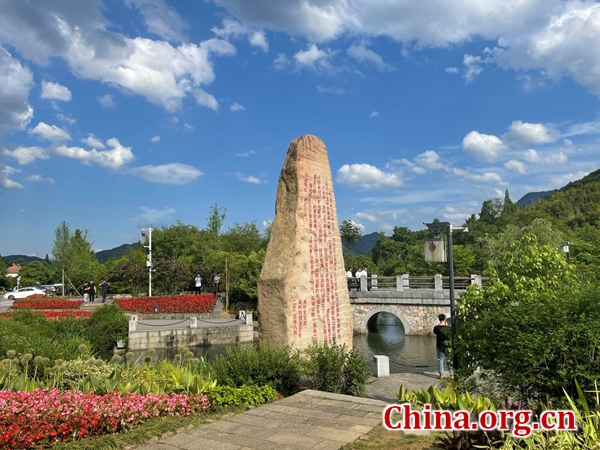Yucun's transformation epitomizes green development stressed in new rural vitalization law
- By Zhang Liying
 0 Comment(s)
0 Comment(s) Print
Print E-mail China.org.cn, May 20, 2021
E-mail China.org.cn, May 20, 2021

"All of our 23 guest rooms remained occupied during the recent five-day May Day holiday," said Pan Chunlin, who runs a farmstay business in Anji county's Yucun village, east China's Zhejiang province.
The 4.86-square-kilometer village with fresh air, clear rivers, and lush mountains is now a popular tourist attraction and an ideal place for weekend getaways. It is hard to believe that the picturesque village was once a major limestone mining area.
Pan worked as a tractor driver in a nearby mine until the early 2000s. During that time, limestone processing for cement manufacture was the main source of income in the area, and locals reeled under dusty air, risking their health and lives for money, Pan recalls.
Suffering immensely from an uncompromising approach to economic growth at the expense of natural resources and the environment, the villagers decided to transform and shut down all the mines and cement factories by the end of 2004.
Guided by the understanding that "lucid waters and lush mountains are invaluable assets," the village has now eased pollution, restored green coverage, and practiced environmental conservation for more than a decade, turning previously heavily polluted mining grounds into scenic areas with beautiful fields and gardens.
The local government helped repair roads, build parking lots, improve power and water supplies, and supported residents in setting up agritainment businesses. The pleasant environment and upgraded facilities then fueled a tourism boom and generated handsome incomes for villagers.
According to statistics from local authorities, the collective economic earnings of the village increased from 910,000 yuan in 2005 to 7.24 million yuan in 2020, and the annual per-capita net income grew sixfold from 8,732 yuan to 55,680 yuan.
"The ecology-based revitalization has changed our lives. We now earn much more than we used to and can also enjoy the wonderful rural scenery," Pan said.
The growth model of "turning green into gold" has not only guaranteed the villagers' environmental rights and boosted their income but also promoted their sense of responsibility for the development of their hometown.
Last year, two dozen homestay hotels in the village established an alliance to enhance coordination, standardize services, and better meet the needs of visitors.
Looking forward, Pan said he wants to learn more about business and management, as well as how to customize rural experience products for various groups.
"I'd also like to tell the story of our village's transformation from an area dependent on mining into a more environmentally friendly model based on tourism and a call for more efforts to prioritize ecological conservation," he said.
Yucun's transformation illustrates an important principle in China's recently adopted law on the promotion of rural vitalization.
The law was adopted by China's national legislature on April 29, in a move designed to speed up the development of rural areas while maintaining environmental protection measures.
It stipulates staying committed to the harmony between man and nature, promoting green development, and building an ecological civilization.
It also demands efforts to improve the protection system of key ecosystems and the ecological compensation mechanism.
Zhang Qi, director of the China Institute for Poverty Reduction at Beijing Normal University, said green development is essential to advancing rural vitalization and relieving relative poverty.
"Ecological resources in areas that have shaken off poverty can be translated into value advantages through rural vitalization efforts," he said.
The law, which contains 10 chapters and 74 articles, will come into force on June 1.
In 2017, China proposed a rural vitalization strategy as a key move to accelerate the modernization of agriculture and rural areas, and has since adopted a host of policies to chart the roadmap toward rural vitalization.
In this year's government work report, China pledged to implement the strategy of rural vitalization in an all-round manner, promoting the stable development of the agricultural sector and increasing farmers' incomes.





